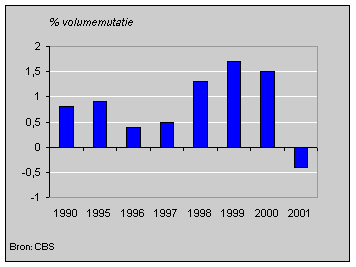Labour productivity down in 2001

Labour productivity in the Netherlands fell by 0.4 percent in 2001. This is the first times it has decreased since 1987.
Labour productivity in the Netherlands
Productivity fell because production growth slowed down while the increase in employment continued unabated. At 1.4 percent, production, in terms of volume growth of value added, was much lower in 2001 than the 3.4 percent in 2000. Employment grew by 1.9 percent in 2000, and by 1.8 percent in 2001.
Fall in productivity: cyclical phenomenon
The decline in labour productivity is mainly a cyclical phenomenon. In previous years of labour shortage employers had difficulty filling job vacancies, and now they are reluctant to dismiss staff. Initial figures for 2002 indicate a further decrease in labour productivity.
Labour productivity per sector

Manufacturing: labour productivity no longer increasing
There was a turnaround in labour productivity in all major sectors of industry in 2001. In manufacturing, for example, production growth slowed from 5 percent to 0.2 percent. Employment hardly changed in the two years. This was the first time for a number of years that there was no significant increase in labour productivity in the manufacturing industry.
Commercial services: notable fall
Commercial services account for the largest share of employment (46 percent). Here, too, the slowdown in production growth was only partly reflected in low employment growth rates. Remarkably, employment increased by 2.2 percent in trade and the hotel and restaurant sectors, while production did not increase at all.
Care and government: structurally low growth
In the care and government sectors (non-commercial services) labour productivity is structurally low. It is not really possible in these sectors to relate quality improvements to the volume development. In 2001 employment growth accelerated in these sectors: it accounted for nearly half of the growth in 2001.
Labour productivity in an international perspective

Labour productivity not only down in the Netherlands
For purposes of international comparison, labour volume is usually expressed in employed persons, not in labour-years. Compared with other prosperous European countries, Dutch labour productivity fell relatively sharply, by 0.5 percent. One tenth of a percent point of this decrease can be attributed to an increase in part-time work. The Netherlands has the highest percentage of part-timers in Europe (42%), and in the definition used, they count as full-time employees.
Petra van Lochem and Michiel Vergeer